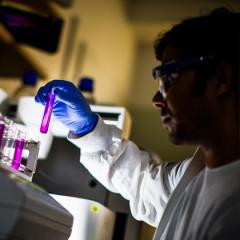An AIBN developed magnetic resin will be trialled at wastewater treatment plants to remove harmful PFAS - aka ‘forever chemicals’ - so sewage can be safely reused as fertiliser.
The sorbent developed by AIBN's Dr Cheng Zhang has already shown promise as a safe and cost-effective filtration tool that removes per- and polyfluoroalkyl substances (PFAS) from water.
Now Dr Zhang will lead a $7 million project with AIBN colleague Dr Zicheng Su and a consortium of commercial partners led by ViridAU to show his magnetic resin can also remove PFAS from semi-solid effluent.

The group plan to trial and scale up the resin at Australian treatment plants over the next three years using $5 million from commercial partners and a $2 million Federal Government Cooperative Research Centres Project (CRC-P) grant.
“Australia has about 700 wastewater treatment plants and they are among the last lines of defence we have when it comes to PFAS,” Dr Zhang said.
“But completely removing PFAS from the materials we flush down the drain – especially heavier organic matter – is not a simple task.”
“What we have created is a product that protects human and environmental health without completely re-engineering the systems already in place.”
Current biosolids treatment technologies for PFAS includes high-temperature pyrolysis and incineration, both of which are energy-intensive and generate secondary pollutants.

Dr Zhang said the resin removes PFAS through an innovated magnetic ion-exchange technique that operates at room temperature.
Join The Network
Stay on top of our industry news and developments, events and opportunities, by joining The Network
“Australia already produces more than a million wet tonnes of biosolids each year for land rehabilitation and agriculture,” Dr Zhang said.
“But PFAS is so pervasive that biosolids sold as fertiliser can still trigger environmental and regulatory concerns.
“The beauty of our technology is therefore in its dual purpose: protecting the environment from PFAS - and safeguarding downstream compost use and agricultural products.”
Dr Zhang said the three-year CRC-P project aimed to produce a scalable product that puts Australia at the forefront of global PFAS management.
“As global regulations on PFAS discharge tighten – particularly in Europe and the US – there will be a growing need for advanced remediation solutions,” Dr Zhang said.
“Our technology will not only improve compliance with international standards, it also provides safer access to products for irrigation and land management.”
Commercial collaborators in the CRC-P project also include ALS, GlobalSync LLC Humanitarian Foundation, and Shimadzu Oceania Pty Limited.
Dr Zhang’s PFAS sorption technology has been patented by UQ commercialisation arm UniQuest.
PFAS substances are synthetic compounds used in industry and consumer products since the 1950s, but they persist in the environment potentially leading to human health problems.
If successful, this innovation will not only help safeguard Australia’s environment and food systems but could also provide a scalable solution for communities worldwide grappling with the persistent challenge of ‘forever chemicals’.
Want to learn more about this story or how you can partner with AIBN on ground-breaking research?
Contact us via email: communications@aibn.uq.edu.au
or phone: +61 414 984 324


